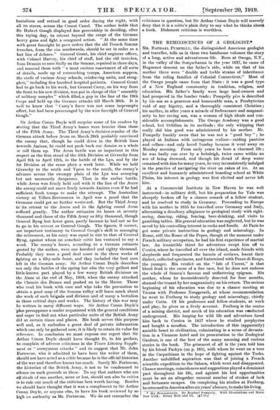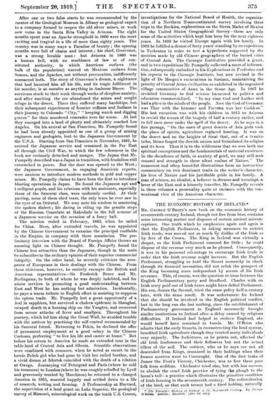THE REMINISCENCES OF A GEOLOGIST.*
Ma. Rernent. PUMPELLY, the distinguished American geologist and traveller, tells us in these two handsome volumes the story of a long, active and adventurous dife. Born at Owego, N.Y., in the valley of the Susquehanna in the year 1837, he came of Huguenot descent on the father's side, while on that of his mother there were " double and treble strains of inheritance from the ruling families of Colonial Connecticut." Most of the Owego people came from that State : it was a good type of a New England community in tradition, religion, and education. His father's family were large land-owners and had prospered in the lumber trade; Pumpelly pZre is described by his son as a generous and honourable man, a Presbyterian void of any bigotry, and a thoroughly consistent Christian ; his mother, in after years a miracle of forbearance and magnani- mity to her roving son, was a woman of high ideals and con- siderable accomplishments. The Owego Academy was a good school, but Orbilian in its methods ; the only whipping that really did him good was administered by his mother. Mr. Pumpelly frankly owns that he was not a " good boy " ; he played at Indians with outrageous realism—raiding pantries and cellars—and only loved Sunday because it went away on Monday morning. From early years he bore a charmed life ; he was badly run over by a bobsleigh, twice came within an ace of being drowned, and though his dread of deep water remained with him for many years, he very inconsistently indulged in the practice of navigating the river on cakes of ice. At an excellent and humanely administered boarding school at White Plains, his interest in geology was first elicited and never left him.
At a Commercial Institute in New Haven he was well instructed—in military drill, but his preparation for Yale was abruptly broken off by a chance remark of a fellow student, and he resolved to study in Germany. Proceeding to Europe with his mother in 1855 he travelled over Germany and Italy, alternating a desultory allegiance to geological study with sight- seeing, dancing, riding, fencing, beer-drinking, and visits to gambling tables. His general education was neglected, but he was saved by his controlling interest in rocks and fossils. At Paris he got some private instruction in geology and mineralogy. In Rome, still the Rome of the Popes, though at the moment under French military occupation, he had his first experience of martial law. An irresistible thirst for adventure swept him off to Corsica, where he travelled all over the island, made friends with shepherds and frequented the haunts of outlaws, learnt their dialect, collected specimens, and fraternized with Pozzo di Borgo, the younger. His verdict on the " Isle of Unrest," is that blood feud is the curse of a fine race, but he does not endorse the whole of Seneca's famous and unflattering epigram. His mother, whom he inconsiderately deserted for four months, shamed the truant by her magnanimity on his return. The serious beginning of his education was due to a chance meeting at Vienna with Professor Noeggerath, at whose recommendation he went to Freiburg to study geology and mineralogy, chiefly under Cotta. Of his professors and fellow-students, at work and play, he gives us a lively account. Freiburg is the centre of a mining district, and much of his education was conducted underground. His longing for wild life and adventure lured him back to Corsica in 1857 where he studied porphyries and bought a mouflon. The introduction of this (apparently) amiable beast to civilization, culminating in a scene of devasta- tion in a Viennese hotel and its presentation to the Zoological Gardens, is one of the best of the many amusing and curious stories in the book. The grimmest of all is the yarn told him by his friend Parkyn (on p. 165), with whom he went on a tour in the Carpathians in the hope of fighting against the Turks. Another unfulfilled aspiration was that of joining a French scientific expedition to the Sahara, which went and disappeared. Chance meetings, coincidences and suggestions played a dominant part throughout his life, and against his lost opportunities must be set an altogether unusual number of strokes of luck and fortunate escapes. On completing his studies at Freiburg, he returned to America after six years' absence, to make his living.
• My Reminiscences. By Raphael Pumpelly. With Illustrations and Maps. New York: Henry Holt and Co. [$750.1 After one or two false starts he was recommended by the curator of the Geological Museum in Albany as geological expert to a company formed to reopen the old silver mines, or work new veins in the Santa Rita Valley in Arizona. The eight months spent near an Apache stronghold in 1860 were the most exciting and tragical in a life of more than eighty years. The country was in many ways a Paradise of beauty ; the opening months were full of charm and interest ; his chief, Grosvenor, was a strong lovable man : but Arizona in 1860 was a human hell, with no semblance of law or of con- stituted authority, in which American outlaws (the bulk of the population) warred on Mexican outlaws from Sonora, and the Apaches, not without provocation, indifferently massacred both. The story of Grosvenor's dream, a nightmare that had haunted him all his life, and its tragic fulfilment in his murder, is as macabre as anything in Ambrose Bierce. The survivors stuck to their work through weeks of sleepless anxiety, and after smelting the ore abandoned the mines and sought refuge in the desert. There they suffered many hardships, but their subsequent experiences of frontier ruffians and Indians in their journey to Colorado " City," " keeping watch and digging graves " for their murdered comrades were far worse. At last they emerged into a land of plenty and ultimately reached Los Angeles. On his arrival at San Francisco, Mr. Pumpelly found he had been already appointed as one of a group of mining engineers and geologists, lent to the Japanese Government by the U.S.A. Starting from San Francisco in November, 1861, he entered the Japanese service and remained in the Far East all through the Civil War, to which the few references in the book are curiously detached and meagre. The Japan that Mr. Pumpelly described was a Japan in transition, with feudalism still entrenched in power. But the door was opened to the West ; the Japanese Government, in engaging American experts, were anxious to introduce modern methods in gold and copper mines. Mr. Pumpelly claims to have been the first to introduce blasting operations in Japan. He found the Japanese apt and i itelligent pupils, and his relations with his assistants, especially those of the Samurai class, were uniformly cordial. At their parting, some of them shed tears, the only tears he ever saw in the eyes of an Oriental. We may note his wisdom in mastering the spoken dialect ; his daring in riding up the granite steps of the Russian Consulate at Hakodade in the full armour of a Japanese warrior on the occasion of a fancy ball.
The mission ended in February, 1863, when he sailed for China. Here, after extended travels, he was appointed by the Chinese Government to examine the principal coalfields in the Empire, in company with three mandarins. The pre- liminary interview with the Board of Foreign Affairs throws an amusing light on Chinese thought. Mr. Pumpelly found the Chinese less attractive than the Japanese, though in the main he subscribes to the ordinary opinion of their superior commercial integrity. On the other hand, he severely criticizes the arro- gance of Europeans in their dealings with the Chinese. From these strictures, however, he entirely exempts the British and American representatives—Sir Frederick Bruce and Mr. Burlingame, to both of whom he was deeply indebted, and for whose services in promoting a good understanding between East and West he has nothing but admiration. Incidentally, he pays a warm tribute to English effort in assisting to suppress the opium trade. Mr. Pumpelly lost a great opportunity of a deal in sapphires, but survived a cholera epidemic in Shanghai, escaped death in a burning ship on the Yangtze, and recovered from severe attacks of fever and smallpox. Throughout his journey, which led him along the Great Wall, he avoided trouble with the natives by practising the self-control recommended by his Samurai friend. Returning to Pekin, he declined the offer of permanent employment at a good salary in the Chinese Customs, preferring " to live his life and career at home." But before his return to America he made an extended tour in the table-land of Central Asia and Siberia. Scientific observations were combined with romance, when he acted as escort to the heroic Polish girl who had gone to visit her exiled brother, and a vivid dream at Irkutsk coincided with the death of a relation at Owego. Journeying rid Petrograd and Paris (where he sold his treasures) to London (where he was roughly rebuffed by Lyell and generously treated by Murchison) he returned to a changed America in 1865, married happily and settled down to a life of research, writing and farming. A Professorship at Harvard, the supervision of a land grant on Lake Superior, the geological survey of Missouri, mineralogical work on the tenth U.S. Census, investigations for the National Board of Health, the organiza- tion of a Northern Transcontinental survey involving three trips in the Rockies, explorations on the Sierra Madre of Mexico for the United States Geographical Survey—these are only some of the activities which kept him busy for the next eighteen years. In 1893 he visited Europe again with his family. In 1903 he fulfilled a dream of forty years' standing by an expedition in Turkestan in order to teat a hypothesis suggested by the mention made by old Chinese geographers of the buried cities of Central Asia. The Carnegie Institution provided a grant, and in two expeditions Mr. Pumpelly collected a mass of informa- tion, subsequently embodied in his Explorations in Turkestan and his reports to the Carnegie Institute, but now revised in the light of De Morgan's excavations in Susiana, maintaining the priority of Central Asian civilization as exhibited in the organized village communities of Anau in the Stone Age. In 1907 he revisited Germany to find science harnessed to politics and education commercialized. " In my time God and Luther still had a place in the minds of the people. Now the God of Germany was Thor with the hammer and Forttma was her Goddess.", His last excursion was with his children in 1915 to Arizona to revisit the scenes of the tragedy of half a century earlier, and to fall once more under the spell of the desert. As he says in a fine passage, " On the oasis of great deserts of Asia .gods took the place of spirits, agriculture replaced hunting. It was on the desert and on the heights of Sinai that, out of a Semitic tribe, Moses forged the Jewish nation and formulated its religion and its laws. Thus it is to the wilderness that we owe both our spiritual conceptions and the fundamentals of material existence. In the decadence of faith, in anxiety of grief, we may still seek counsel and strength in those silent realms of Nature." The numerous and often beautiful illustrations form an instructive commentary on two dominant traits in the writer's character, his love of Nature and his justifiable pride in his family. A man of science, an idealist, a believer in dreams and warnings, a lover of the East and a leisurely traveller, Mr. Purnpelly reveals in these volumes a personality quite at variance with the con- ventional view of the American character.







































 Previous page
Previous page